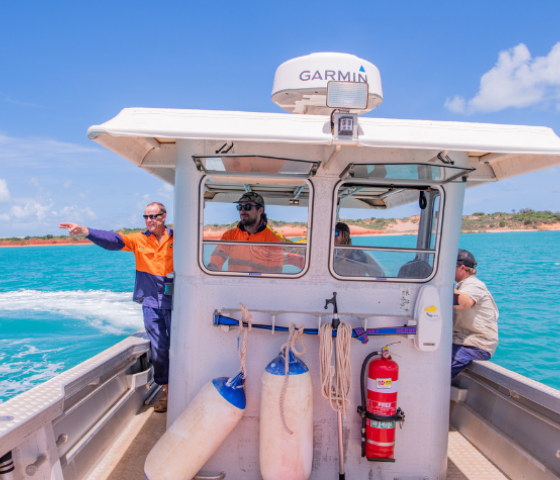MAR10418 Certificate I in Maritime Operations (Coxswain Grade 2 Near Coastal)
This certificate will allow you to:
-
Command a vessel less than <12 meters long and with less than 100kw of power for an inboard engine (however, there are no limitations for outboards).
-
In sheltered waters or within 5 nautical miles from the shore or an aquaculture lease. As a tender or auxiliary vessel operating within 3 nautical miles of a parent vessel within the exclusive economic zone.
- Undertake the duties and perform the functions of a Coxswain Grade 3 NC(opens in a new tab) .

CampusesBroome Campus. Karratha Campus. Pundulmurra Campus.
When Available all year.
Study Mode On campus.
Are you ready to pursue a career at sea?
Embark on your maritime journey with our Certificate II in Maritime Operations (Coxswain Grade 1 Near Coastal). Gain the skills to command vessels under 12 meters, including outboard and inboard engines. Our hands-on training covers coastal navigation, seamanship, and practical engineering scenarios. Prepare for a Coxswain Grade 1 Near Coastal Certificate of Competency with real-world experience and survival training.
Click on the course structure tab for block dates...
Throughout this course, you will gain skills in:
- Handling a vessel less than <12 metres in length
- Applying basic maintenance and environmental knowledge
- Applying safety procedures at sea
-
Demonstrating seamanship skills
- You have minimal sea time and experience and wish to acquire the certification to command a commercial vessel up to <12m, with limiting range, horsepower, and restrictive conditions.
- You have spent a small amount of time on board recreational vessels which may include but not be limited to, Tourism, Aquaculture, Port Operations, or Ranger groups.
- You are already employed or are required to hold this certificate to facilitate employment.
Students will complete face-to-face study over eight days.
To attain this qualification, participants will need to complete the following skill sets:
Coxswain Vessel Operations and Environmental Practice
The Coxswain Vessel Operations and Environmental Practice block is made up of 5 units:
- MARC037 Operate inboard and outboard motors
- MARI003 Comply with regulations to ensure the safe operation of a vessel up to 12 metres.
- MARK007 Handle a vessel up to 12 metres
- MARN008 Apply seamanship skills aboard a vessel up to 12 metres
- MARJ006 Follow environmental work practices.
Course Fees
General fees - $422.05
Concession fees -$211.15
Broome Dates
24 - 28 June
4 - 8 November
Students will also complete practical assessments and be assessed on knowledge-based questions.
Additional requirements.
MARSS00008 Shipboard Safety Skill Set
- MARF027 Apply basic survival skills in the event of vessel abandonment
- MARF028 Follow procedures to minimise and fight fires on board a vessel
- MARF029 Meet work health and safety requirements
- *MARF030 Survive at sea using survival craft
Course Fees
General fees - $186.24
Concession fees -$98.46
Broome Dates
1 - 3 July
25 - 27 September
18 - 20 November
- MARF030 Survive at sea using survival craft (this is included as part of the MARSS00008 Shipboard Safety block and will assist in completing further Maritime studies; however, it isn't a requirement for this course) *this will be an additional cost to the student.